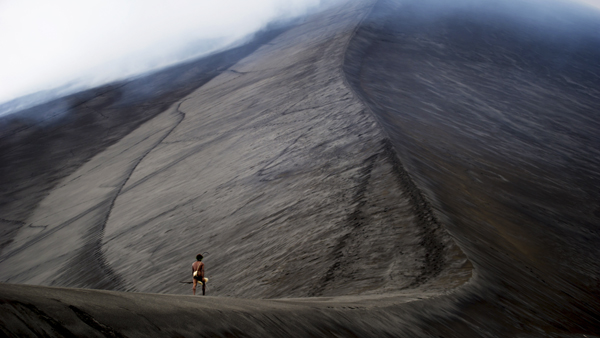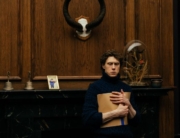Set in a world full of lush forestry and other scenic wonders, the film revolves around an indigenous tribe, the Yakel, on the titular South Pacific island, who have eschewed money for commerce and instead rely on farming and hunting. Here, the traditional ways of their culture, Kastom, are all-important. As such, when a teenager decides to marry for love instead of going through the long-held custom of arranged matrimony, it’s a radical idea—and one with wide-ranging repercussions that threaten the whole community.
The film opens with a young village beauty, Wawa (Marie Wawa), who is on the verge of adulthood, which, as the other women discuss it, seems to carry the unspoken expectation of marriage. Wawa does have someone near and dear to her heart: Dain (Mungau Dain), a hunter, musician, and son of the village chief. On the morning he returns after a long absence, she sneaks out of her family’s house to meet with him in the brush. Selin (Marceline Rofit), Wawa’s younger sister, follows them and sees them standing on opposite sides of a tree, staring at the ground but saying nothing. Due to her age, Selin’s understanding of the situation may be imperfect, but we viewers can immediately comprehend the situation.
While the relationship is blossoming, the village shaman, who is also Wawa and Selin’s grandfather, is attacked by members of an enemy tribe, the Imedin. The two communities have been locked in bloodshed for so long that it is no longer known how the conflict began. After finding the revered man dying, the men of the protagonists’ village want revenge, but they are persuaded against it by the chief, who sees an endless cycle of violence ahead unless there is peace. Thus, the two sides gather and broker a truce in which brides will be exchanged. Since Wawa has just come of age, it is agreed by the men that she will be sent away to wed one of the Imedin.
Wawa does not wish to go through with the arranged marriage, and it is here that the hierarchies of the village, so patiently established during the introductory scenes, come into play. Early on, the women were depicted as having formed their own community within the larger order, performing a ritual involving face-painting to celebrate Wawa’s passage into womanhood, sans the menfolk. But after she balks at the marital arrangement, those same peers try to coerce her into changing her mind. First they warn her that if she refuses, the Imedin will kill more of them. When that doesn’t move her, one elderly matron, who first seems sympathetic to her plight, hints that if Wawa remains in the village, the other women will make her life miserable.
The village chief, meanwhile, reminds Dain that he is in line to rule one day, and so he must learn to sacrifice for the good of all. Despite all the voices influencing them, at a certain point, Dain and Wawa make an impertinent and rash decision, and one from which the rest of the film logically spins out.
Based on a 1987 incident, the film is directed by Martin Butler and Bentley Dean, whose work has a detached quality. Frequently, the camera becomes a passive observer, even at moments when characters are performing quite remarkable feats, such as scaling a tall tree or climbing up to a cavern wall. Meanwhile, the entire cast consists of real villagers speaking in their native languages, and their naturalism contributes to the almost documentary-like feel. The characters all wear minimal clothing, and there is not much self-consciousness in their performances.
Though the film has a timeless story, there is, however, some attempt to ground the proceedings in recent history. At one point, an elder shows Wawa a magazine with photographs of Prince Philip and Queen Elizabeth II as an example of how an arranged marriage can, in fact, result in something long-lasting.
Much of the score relies on ambient noises from the forest, although there are flourishes of synth and opera that underscore moments of dramatic tension. Finally, while Dain and Wawa earn much sympathy as the rebellious couple, the filmmakers repeatedly switch to Selin’s point of view, a choice that ultimately elevates Tanna beyond romance. The audience sees the youngest protagonist come of age before their eyes, and although that journey is not without its disturbing incidents, the ending feels well-earned as a result.
Australia’s entry for the Best Foreign Language Film Academy Award, Tanna combines visual beauty, sympathetic characters, and an underlying message concerning cultural survival into a rich viewing experience.







I love this movie so much h that I wat hed it twice and en outraged my husband to watch it again with me. My greatest desire is to travel to Austraila and New Zealand to see first hand how the residents live and survive in the forest and their majestic simple way of life.